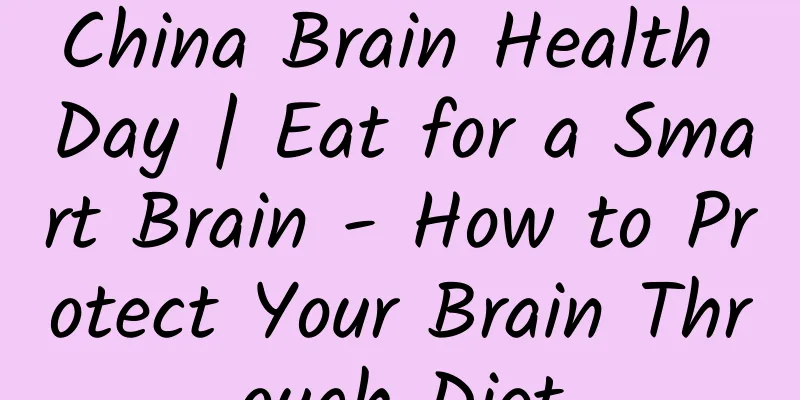China Brain Health Day | Eat for a Smart Brain - How to Protect Your Brain Through Diet

|
Copyrighted images from the gallery, unauthorized reproduction, please contact the original author The brain is one of the most important organs in the human body and is the nerve center of the human body. It is responsible for our memory, emotions, language, learning, movement and other physiological and psychological functions. Various nutrients play an important role in the structure and function of the central nervous system, such as participating in the formation of nerve cells or myelin sheaths, neurotransmitter synthesis, the generation of new synapses or the synthesis of new proteins that are closely related to cognitive processes, etc. This article will briefly introduce how to protect the brain through a scientific diet. 1. What nutrients does the brain need? 1. Carbohydrates (glucose) The brain accounts for about 3-4% of the body mass, but consumes about 20-30% of the body's energy consumption. Carbohydrate-containing foods can provide sufficient glucose to maintain normal blood sugar levels, thereby providing sufficient energy for the brain to keep it functioning normally. 2. Fat Fat accounts for 60% of the brain mass and is the material basis for the formation of nerve cell membranes and myelin sheaths. Among them, unsaturated fatty acids, especially ω-3 fatty acids, such as DHA (docosahexaenoic acid), ALA (α-linolenic acid) and EPA (eicosapentaenoic acid), play an important role in the development and function of the brain. ω -3 fatty acids are also crucial for improving children's attention and learning efficiency. In addition, the brain phospholipid group (including cephalin, phosphatidylinositol, phosphatidylserine, sphingomyelin, lecithin), as a basic component of brain structure and one of the essential substances for neuron growth, plays an important role in promoting brain development and enhancing intelligence. Copyrighted images from the gallery, unauthorized reproduction, please contact the original author 3. Antioxidant nutrients (vitamin C, vitamin E, lycopene, etc.) Neuronal cells have high levels of polyunsaturated fatty acids and are susceptible to oxidative damage, with the characteristics of high oxygen consumption and weak oxidative defense. Antioxidant nutrients (vitamin C, vitamin E, lycopene, etc.) can play an antioxidant role, protect brain cells from damage by free radical oxidative stress, and protect neural tissue. 4. B vitamins B vitamins are effective in improving mood and mental performance and enhancing stress tolerance. Together, this group of vitamins affects memory function and protects against age-related cognitive impairment, plays an important role in the synthesis of hormones related to mood regulation, helps maintain a positive attitude, boosts energy and improves concentration, and also participates in gene expression as a cofactor for enzymes. Vitamin B1 (thiamine) helps brain cells utilize glucose. Vitamin B2 (riboflavin) can reduce oxidative stress caused by free radicals and repair mitochondrial dysfunction. Vitamin B6 can promote the growth and development of brain cells, enhance memory and thinking ability, and help improve sleep quality. Vitamin B12 is an essential component for the synthesis of sphingomyelin, which is the main component of the myelin sheath that protects nerve fibers. It can increase the speed of nerve conduction, promote the growth and repair of nerve cells, and maintain the normal function of nerves. Folic acid is involved in the synthesis and regulation of DNA methylation and neurotransmitters. Pantothenic acid can nourish nerves and enhance brain function. 5. Choline Choline is a component of lecithin and a precursor of acetylcholine. It is an essential nutrient for promoting brain development, improving memory, nerve conduction, promoting fat metabolism, and biological membrane formation. Many scientific studies have pointed out that the content of acetylcholine in the brain is closely related to brain function and memory. Long-term lack of choline can cause a decline in learning ability and memory. 6. Carotenoids The brains of healthy elderly people are rich in carotenoids, most of which are lutein. Lutein and other carotenoids can reduce oxidative stress and inflammation levels, and can also reduce the risk of Alzheimer's disease (AD). Lutein can not only pass through the blood-brain barrier, but also has a special effect on maintaining brain function; people with a high intake of carotene in their diet or high levels of carotene in their blood have slower cognitive decline, fewer white matter lesions in the brain, less brain atrophy, and a lower risk of AD. 2. Which foods can enhance brain function? Reasonable dietary patterns and eating habits have an important relationship to brain health. While enjoying delicious food, we must learn to focus on scientific food combinations to nourish our brains, thereby enhancing brain function and maintaining brain health. Copyrighted images from the gallery, unauthorized reproduction, please contact the original author 1. Fish Fish is a well-deserved brain food, mainly because fish is the main dietary source of omega-3 essential fatty acids. Common fish with high DHA content include tuna, rainbow trout, sardines, hairtail, yellow croaker, carp, hairtail, pomfret, crucian carp, eel, saury, etc. In addition, it is a high-quality source of protein required for the formation of mood-boosting neurotransmitters such as serotonin and dopamine, and is also an important source of vitamin B12. 2. Eggs Eggs contain protein, vitamin B12, choline and other ingredients. Whole eggs are a very rich source of choline. As a precursor of acetylcholine, choline plays an important role in memory and learning. Sufficient acetylcholine is essential for improving memory and the agile and focused thinking required as we age. Copyrighted images from the gallery, unauthorized reproduction, please contact the original author 3. Berries Various berries, such as blueberries, strawberries, raspberries and blackberries, are rich in vitamin C, vitamin E, and flavonoids, which act as potent antioxidants that protect brain cells from oxidative damage. Studies have shown that flavonoids can improve many cognitive functions, including memory, learning and decision-making, and can also prevent age-related neurasthenia and prevent Alzheimer's disease. 4. Dark vegetables In order to protect cognitive ability and reduce the risk of AD, we should pay attention to eating more dark fruits and vegetables. Kale, dandelion leaves, mustard greens, fresh parsley, spinach, lettuce, etc. are all natural foods with high lutein content. Kale is rich in antioxidants, including beta-carotene, flavonoids and polyphenols. It is also a good source of vitamin C and B vitamins, especially folic acid, and is one of the high-quality foods for maintaining brain health. It is worth mentioning that pumpkin and other fruits are rich in carotene and vitamin E, which have the effects of protecting eyesight, anti-aging, and enhancing memory. 5. Nuts Walnuts are one of the best food sources of ALA (alpha-linolenic acid). Studies have found that eating walnuts can improve reaction time and is beneficial to learning and memory. Sunflower seeds are rich in iron, zinc, potassium, magnesium, and vitamin E, which can keep the brain sharp, enhance memory, and prevent anemia. Peanuts are rich in lecithin and cephalin, which are important substances needed by the nervous system. They can delay the decline of brain function and help prevent the formation of cerebral thrombosis. 6. Sea vegetables Marine vegetables are rich in mineral elements such as iodine, and some are also a good source of vitamin B12, which is essential for brain and nerve health. For example, seaweed is rich in vitamin B12. In addition, marine vegetables are also a good source of tyrosine, which is a precursor amino acid of dopamine in the brain and plays an important role in maintaining brain function. 7. Dark Chocolate Copyrighted images from the gallery, unauthorized reproduction, please contact the original author Chocolate is a great source of tryptophan, a precursor amino acid for serotonin (5-HT), which promotes brain plasticity and helps prolong the life of brain cells. The flavonoids in chocolate can stimulate blood flow to the brain, helping improve memory, concentration, and problem-solving skills. 3. In conclusion: For brain health, in addition to the nutrients and foods we mentioned above, there are many other important nutrients, such as protein, which are contained in various foods. No natural food can meet the energy and all nutrients required by the human body. Different types of food contain different types and quantities of nutrients and other nutrients. Therefore, in our daily life, we need to pay special attention to a balanced diet, a variety of foods, and a reasonable combination to ensure that the human organs and functions, including the brain, function normally and efficiently. author: Li Huzhong, Associate Researcher, Nutrition Laboratory 1, National Center for Food Safety Risk Assessment Qu Pengfeng, Associate Researcher, Nutrition Laboratory 1, National Food Safety Risk Assessment Center Wang Qihe Assistant Researcher, Nutrition Laboratory 1, National Food Safety Risk Assessment Center Audit: Fang Haiqin, Researcher, Nutrition Laboratory 1, National Food Safety Risk Assessment Center Co-production: Popularize China Central Kitchen and National Food Safety Risk Assessment Center |
<<: A "paper airplane" that can be folded in one hour destroyed a fighter jet worth $100 million...
Recommend
"Surpassing" GPT-4 in all aspects, approaching human comprehension ability! Is the world's most powerful model really here?
Recently, Anthropic, a large model company known ...
How much does it cost to create a nail art mini program in Suining?
The main factors affecting the price of mini prog...
How to make reasonable use of 3 types of ground promotion methods?
A few days ago, when I passed the Gaoxinyuan subw...
Recommended development of Foshan mini program mall, how to choose Foshan mini program development company?
Mini programs are all developed by companies with...
Guangzhou takeaway platform mini program development, what are the advantages of catering takeaway mini program?
Soon after the beginning of the year, epidemics b...
Star 1 full review
As of 11:00 a.m. on April 18, the search index of...
Cortana is good, but can it save Microsoft?
On July 30, Microsoft finally found a partner for ...
What are the characteristics of the facial recognition system at the construction site entrance and exit?
With the development of technology, facial recogn...
New features are all awesome! WeChat Android beta version 7.0.15 experience
Since WeChat last added a new dark mode, it has r...
Continental builds wireless charging terminal for Mercedes-Benz, eliminating clutter in one go
Recently, Continental announced that it has devel...
There is new news about China’s moon landing program!
When will the Chinese achieve their goal of landi...
.NET is open source, Visual Studio starts to support Android and iOS programming and comes with an Android emulator
At the Connect() conference held early this morni...
Boss, let’s talk about the most effective channel for attracting new customers!
Background knowledge: CAC = cost to acquire a sin...
After four years of waiting, Apple finally fixed the issue of Siri searching for "abortion"
Shortly after the release of the iPhone 4S in 2011...


![[Hui Says English] The fifth session of the one-stop English listening and speaking training camp](/upload/images/67cbff5f0e9ad.webp)






